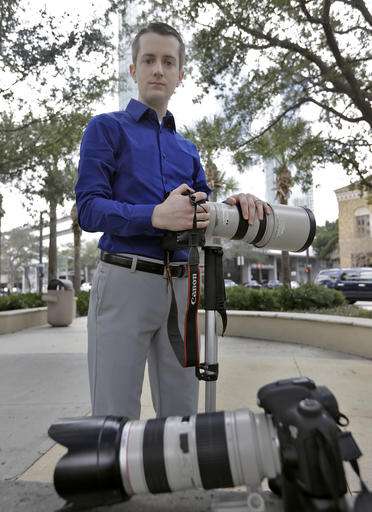Rise in premiums lays bare two Americas on health care

Michael Schwarz is a self-employed business owner who buys his own health insurance. The subsidized coverage "Obamacare" offers provides protection from life's unpredictable changes and freedom to pursue his vocation, he says.
Brett Dorsch is also self-employed and buys his own health insurance. But he gets no financial break from the Affordable Care Act. "To me, it's just been a big lie," Dorsch says, forcing him to pay more for less coverage.
Schwarz and Dorsch represent two Americas, pulling farther apart over former President Barack Obama's health care law. Known as the ACA, the law rewrote the rules for people buying their own health insurance, creating winners and losers.
Those with financial subsidies now fear being harmed by President Donald Trump and Republicans intent on repealing and replacing the ACA. But other consumers who also buy their own insurance and don't qualify for financial help feel short-changed by Obama's law. They're hoping repeal will mean relief from rising premiums.
The ACA sought to create one big new market for individual health insurance in each state. It required insurers to accept all customers, regardless of medical problems. And it provided subsidies to help low- and moderate-income people afford premiums.
These newly vested ACA customers joined consumers already in the market, to make a new insurance pool. Policies offered to all had to be upgraded to meet new federal standards for comprehensive benefits, raising premiums. And many of the new customers turned out to be sicker than insurers expected, pushing rates even higher.
Consumers who didn't qualify for government financial help wound up bearing the full cost of premiums. They also faced the law's new requirement to carry health insurance or risk fines.
"One (group) is angry and one is incredibly grateful," said Robert Blendon of the Harvard T.H. Chan School of Public Health. If Trump and congressional Republicans aren't careful, their actions could stoke fresh grievances without solving longstanding problems of access and cost.
Consider what happened to Schwarz and Dorsch this year, as premiums for a standard plan through HealthCare.gov jumped an average of 25 percent.
Schwarz and his wife are in their mid-20s and live in Tampa, Florida. He has his own commercial photography business and she's pursuing a graduate degree in speech-language pathology.
The sticker price of their HealthCare.gov policy went up about 20 percent, but what they pay monthly is about $115 lower than last year. Not only did their subsidy cover the rise in premium, they're also getting more help because their income went down when Schwarz's wife returned to school full time.
"Being uninsured is not an option," said Schwarz. If Republicans take away his subsidy, "I would have to change careers and find a job that offered health insurance," he said.

Dorsch and his wife live in Wilmington, Delaware, and are in their mid-50s. He has a wholesale business supplying electronics to retail stores and has been buying his own health insurance for years. He gets no financial help from the ACA.
Dorsch said their insurance company wanted to raise the monthly premium to $2,050, or nearly $25,000 a year. They settled for a skimpier plan that still costs $1,350 a month and has a very high deductible.
"In four years my health insurance has more than doubled and I have less coverage," said Dorsch. "It's ludicrous."
He voted for Trump. "He saw the reality that Obamacare has been a nightmare for most Americans, unless you are poor or in a very difficult situation," said Dorsch.
The Congressional Budget Office estimates that the pool of people buying individual health insurance is basically split down the middle among subsidized customers like Schwarz and those who get no help, like Dorsch.
Republican proposals to tie tax credits to age, not income, would help Dorsch. But they may not be generous enough for Schwarz.
"It's trying to find the way to help the one without hurting the other that's really tricky," said Nicholas Moriello, a health insurance broker from Newark, Delaware. "If we had a way to help the person whose premium has become unaffordable without hurting the person we are currently subsidizing."
Caroline Pearson, of the consulting firm Avalere Health, studied consumers on government marketplaces like HealthCare.gov—where nearly 90 percent get subsidies—and compared them with those who purchase directly from an insurer and pay full cost.
Among Avalere's findings:
— The majority of consumers in the government marketplaces live in lower-income neighborhoods with high unemployment. However, among those who purchase directly from an insurer, about 30 percent live neighborhoods with a median income of $100,000 or more.
— Consumers in the subsidized market are generally costlier to cover. For those with a standard plan, per-person medical claims averaged $376 per month in 2015, compared to $312 for unsubsidized customers who bought policies directly from an insurer.
— The subsidized market is important in states that voted for Trump. In Florida, for example, 70 percent of individual policyholders purchase through HealthCare.gov.
"Obamacare helped a lot of lower-income people with high health needs who previously couldn't afford insurance," said Pearson. "It overlooked the fact that there are a lot of people who are relatively healthy and who didn't want the increased benefits. More sick people drove up premiums, which is resulting in some people feeling like they are worse off."
© 2017 The Associated Press. All rights reserved.




















